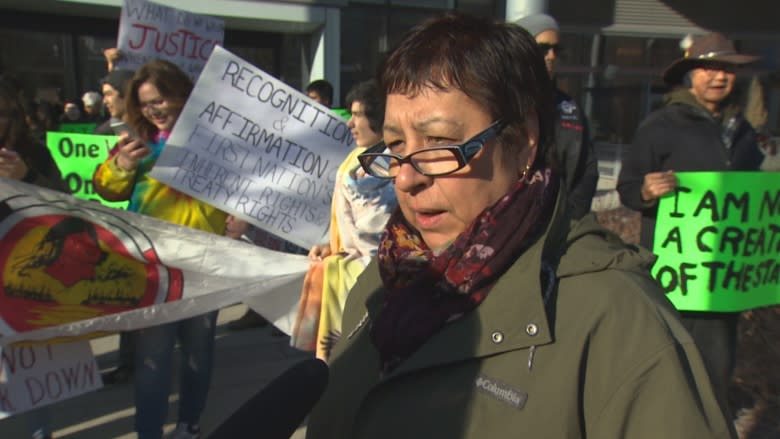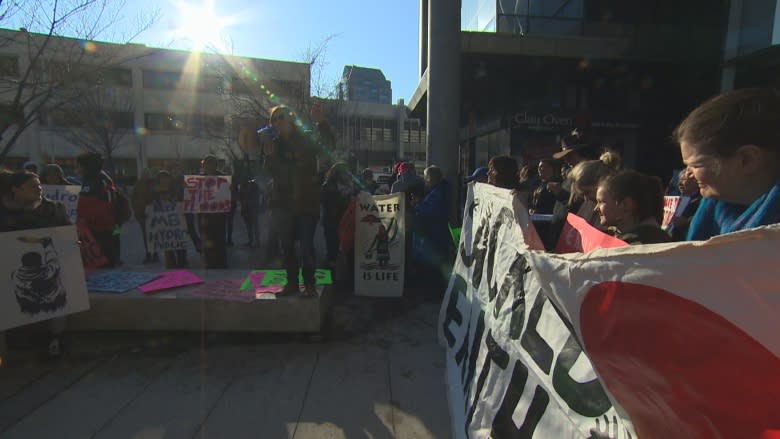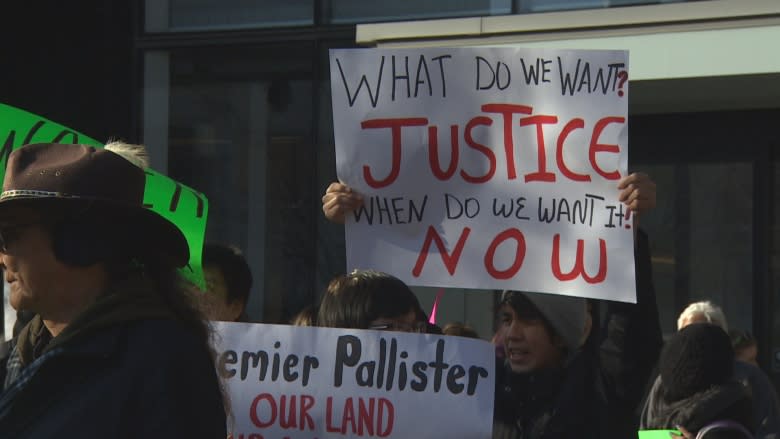Manitoba 'Hydro justice' rally gains support on heels of board resignations
About a hundred people chanted "hydro justice" as they marched through downtown Winnipeg Thursday evening calling on Manitoba Hydro to properly compensate Northern Manitoba First Nations. The rally was organized by the Manitoba Energy Justice Coalition and an alliance of hydro impacted communities called Wa Ni Ska Tan, which means "rise up" or "wake up" in Cree.
The crowd gathered outside the Manitoba Hydro building on Portage Avenue then walked to Thunderbird House at Main Street and Higgins Avenue.
The event, which had already been set to take place on March 22 — World Water Day — seemed to attract more support after all but one member of the Manitoba Hydro board resigned the day before.
"Hydro needs to be more accountable for what they're doing to our lands and our way of life," said organizer Carol Kobliski.
The rally aimed to dispel myths about the relationship between Manitoba Hydro and Indigenous peoples.
She said the compensation Hydro pays to First Nations for past projects ends up going right back to the Crown corporation to cover high energy costs in remote communities.
"We're paying high rates in Northern Manitoba and for people down south, they're paying for cheap power — that's what's happening, and that shouldn't be. Especially when we have dams in our own backyards," said Kobliski, who is from Nelson House First Nation.
Kobliski was one of the representatives from five Hydro-affected Northern Manitoba First Nations — Nelson House, South Indian Lake, Sagkeeng, Cross Lake and Grand Rapids — who attended the rally and spoke to the crowd.
"We're fed up with what's going on, and how we're left out and how things are just fast-tracked in regards to our resource areas our lands, there's not proper consultation, really and these dams are just coming up all over the place," said Kobliski.
Students bused in to attend rally
A bus load of students from Sagkeeng First Nation made the 118 km trip south to Winnipeg to attend the rally.
"A lot of the kids here just want to make an impact," said Linda Dorie, a Sagkeeng band councillor. "We made every opportunity for them to come and be a part and to share with the world that we are here and we are ready to make our voices loud and clear."
Dorie said the students have seen the impact Hydro has had on their communities firsthand.
"Our land is being eroded so bad, and we need people to hear our voices and our concerns," said Dorie.
She wanted the students to know their Treaty rights and ensure those rights are respected not just for this generation, but for those to come.
In 1977 the federal government and Manitoba Hydro signed the Northern Flood Agreement with four First Nations in an effort to compensate them for damage caused to their land and waterways as a result of two major construction projects known as Lake Winnipeg Regulation and the Churchill River Diversion Project. The Crown corporation later signed settlement agreements with a number of other First Nations to also address the adverse effects of Hydro's existing operations on the customs, practices and traditions of Indigenous people.
"What worked one time doesn't always work later down the road," said Laura Tyler from the Manitoba Energy Justice Coalition, which helped to organize the rally. "Some things could have been predicted ... other things not so much."
Tyler said Hydro should revisit the agreements it has with Indigenous communities to ensure they are properly compensated for the effects past projects have had on their lands and livelihoods.
"After having toured the north and seeing all the communities affected up there by the energy we enjoy everyday I just couldn't sit by and not take action," said Tyler.
Tyler said as a result of Manitoba Hydro's use of land and resources in the north, fisheries that used to support thousands of people can barely support a hundred.
She said shorelines are eroding, and many Indigenous people are living in substandard conditions, while Hydro workers temporarily stationed in the area are living in far better housing than local residents.





